

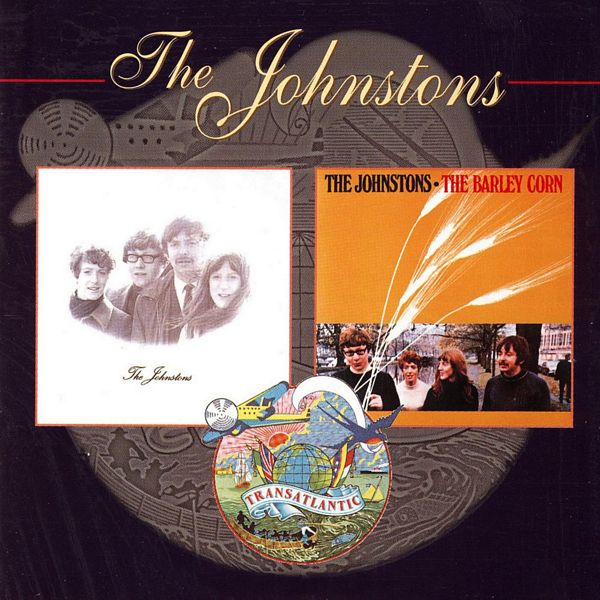 |
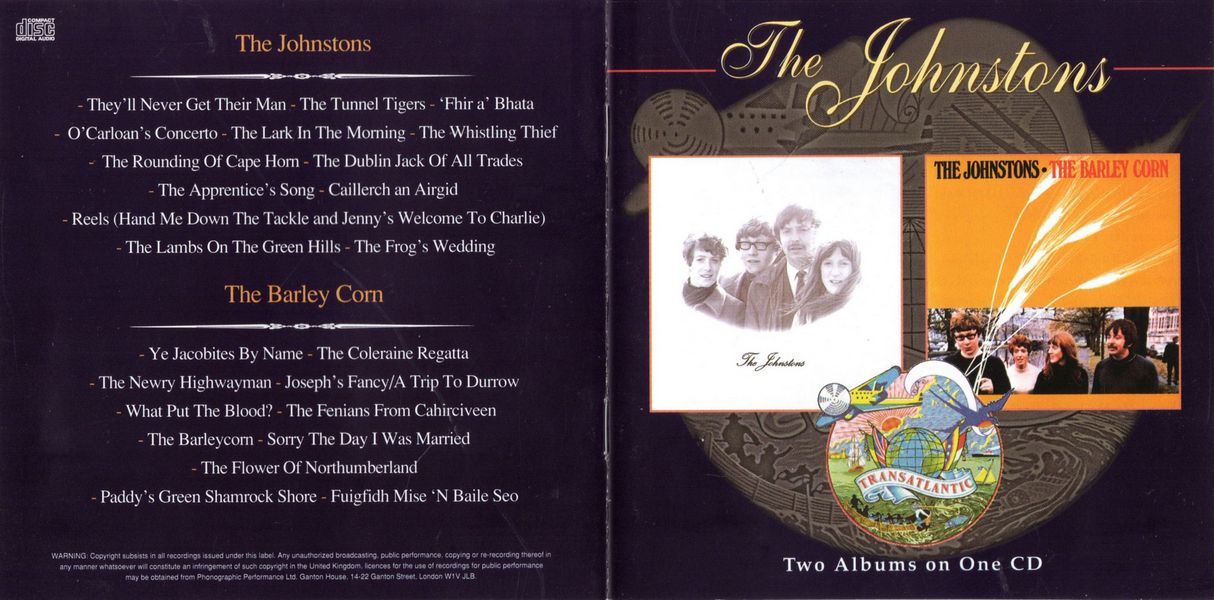
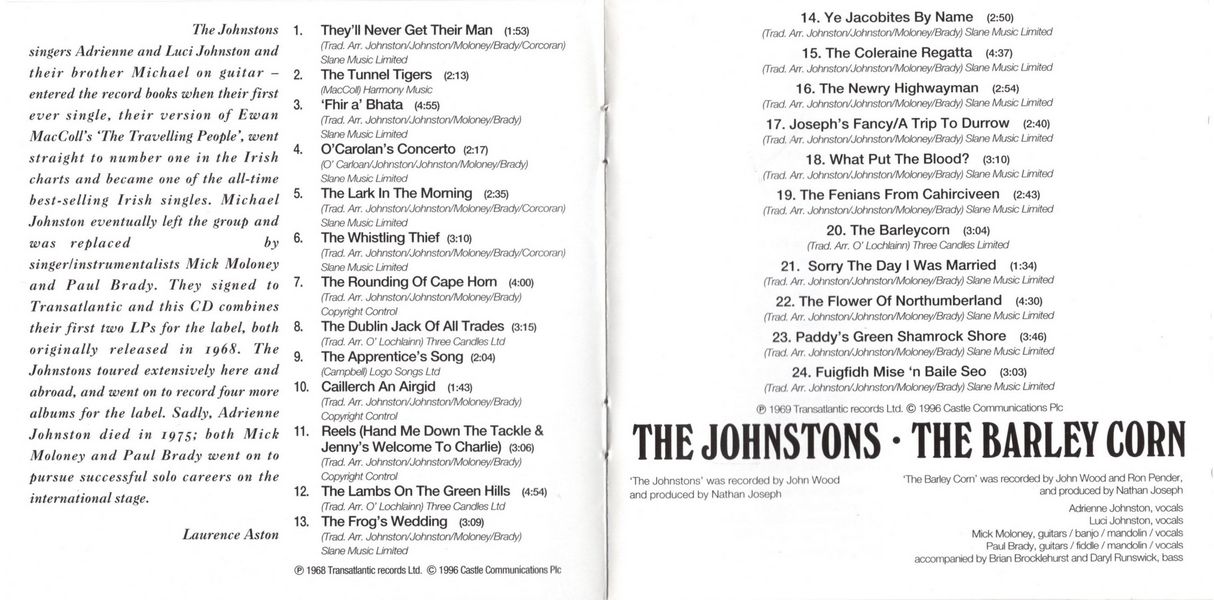 |
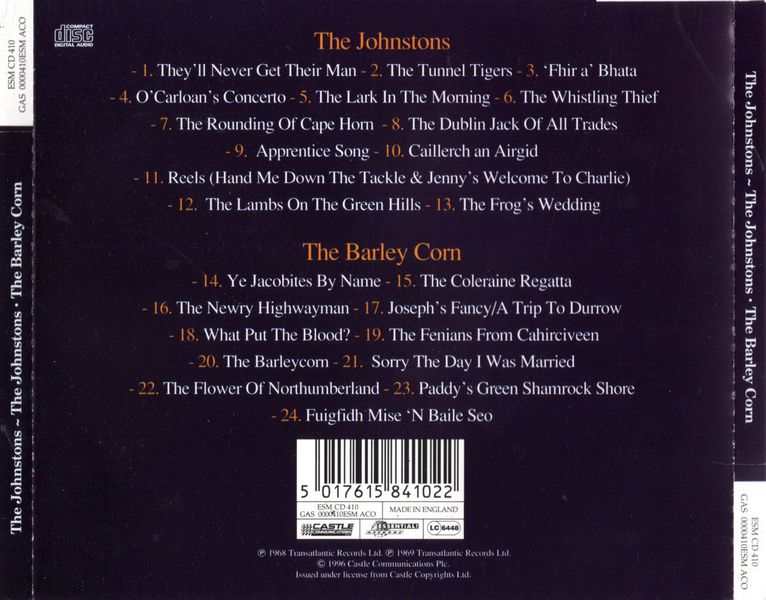
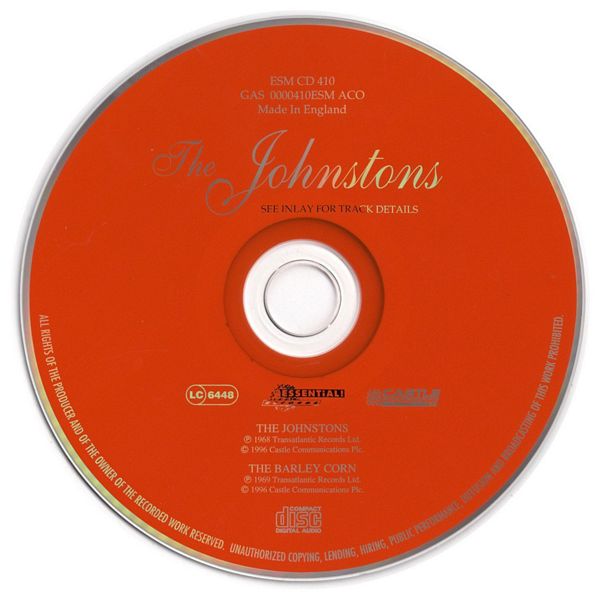 |
| more images |
Sleeve Notes
The Johnstons singers Adrienne and Luci Johnston and their brother Michael on guitar — entered the record books when their first ever single, their version of Ewan MacColl's 'The Travelling People', went straight to number one in the Irish charts and became one of the all-time best-selling Irish singles. Michael Johnston eventually left the group and was replaced by singer/instrumentalists Mick Moloney and Paul Brady. They signed to Transatlantic and this CD combines their first two LPs for the label, both originally released in 1968. The Johnstons toured extensively here and abroad, and went on to record four more albums for the label. Sadly, Adrienne Johnston died in 1975; both Mick Moloney and Paul Brady went on to pursue successful solo careers on the international stage.
Laurence Aston
They'll Never Get Their Man — A nonsense song with an attractive melody and chorus. The song is set In the Belfast weaving mills at the turn of the century and deals with the weavers, the doffers, the spinners and the fleurers (embroiderers), Why the last named always get their man is not quite clear.
The Tunnel Tigers — Much of the strain has been taken off successive Irish governments since 1847 by what has been called by political observers "Ireland's safety valve" the emigrant ship. The emigration is for the most part not born of the characteristic Irish wanderlust invented by the apologists, but Is In fact born of harsh economic necessity. Ewan MacColl, here using the Wexford all of Willie Taylor, gives us a glimpse of the sad and stark reality of what the emigrants leave behind them while they are building the tunnels on the Victoria underground line.
'Fhir A' Bhata — A Scottish Gaelic song now found In Ireland. The words are a mixture of both Scottish Gaelic and Irish. We did our best to stick to the original Scottish version and make due apologies for our Irish pronunciation of that language.
O'Carolan's Concerto — A tune recently revived and en|oying great popularity at the moment. Composed reputedly as part of a contest between O'Carolan (a blind Irish harpist who lived in County
The Lark In The Morning — A Northern Ireland song with a strong English influence. The tact and subtle innuendo in the folk tradition is obvious here and makes this superior to cruder versions.
The Whistling Thief — A lonely cottage in the wild countryside of West Kerry, the shrill whistling of an ardent young suitor, the blind old woman by the fire listening, the daughters fanciful explanations, the mother's exposure of the daughter's attempted trickery — they don't make songs like this any more.
The Rounding Of Cape Horn — This song has a tremendous emotional effect on us every time we sing it. It is so good a song that it takes very little effort or imagination to identify oneself with the sailors on "the gallant frigate Amphitrite". How far removed it all is from comfortable middle class affluence.
Dublin Jack Of All Trades — An anthology of street names in Dublin would best describe this one.
The Apprentice's Song — Most folk singers are very selective about their choice of modern material. Not every modern composition masquerading under the 'folk' label is in fact within the boundaries of the folk idiom and tradition. Here undoubtedly is an exception, Ian Campbell's delightful song about the first working days of the apprentice fitter in the gasworks.
Cailerch an Airgid (The Rich Old Hag) — A Connemara song set to the tune of an old jig. The singer laughs and jeers at a young man who is about to marry an old hag for her money, so much money she could "run a coach service around the coast". The hearty chorus adds the final derisive touch to the song, "she is your grandmother", a taunt guaranteed to dampen any young man's enthusiasm.
Hand Me Down The Tackle & Jenny's Welcome To Charlie — Mike and Paul play two reels.
The Lambs On The Green Hills — From Colm o'Lochlainn's first collection of Irish songs. It is related closely to the Scottish 'I Once Loved A Lass' and countless other variants of the most familiar theme in folk music, the story of unrequited love.
The Frog's Wedding — An Irish variant of the familiar 'frog and missy mouse' story long sung to children the world over. The song was collected in Northern Ireland by Frank Lunny, given to Sean Corcoran and thence to us.
We would like to extend a special word of thanks to Christy Moore and Frank Lunny from Newbridge, Mary McGannon, Kevin Conneff, Paddy McEvoy, Terry Wilson and Glasgow's Willie Beaton who have all been instrumental in building up our knowledge and consciousness of folk music.
Most of all we thank Sean Corcoran from Drogheda without whom our repertoire would be considerably poorer. To him we are either directly or indirectly indebted for six songs on this album.
We also salute the mighty traditional musicians of Clare in whose presence we will always feel humble. These are the unsung heroes of folk music.
Notes by The Johnstons.
Ye Jacobites By Name — An anti-Jacobite song heard from Johnny Butler of Sheffield and Willie Beaton of Glasgow. The theme is essentially a pacifist one — the Jacobites being taken to task for their violent ways. It is doubtful however whether the pacifists found anything to enthuse about in King James' successors, a political dilemma not solely associated with the 17th Century.
The Coleraine Regatta — 'The Coleraine Regatta' fails into the category of "Local Ballads or Songs" — songs dealing with isolated events of no particular interest, apart from their humorous side, to anyone unfamiliar with the people or place in question. These songs are nevertheless important in that, not only do they give, by virtue of the author's personal touch, a very clear insight into the life at the time, but they are crammed so full of antique phraseology and examples of contemporary speech, as to be of considerable importance on that score alone. One very interesting facet of this particular song is that it was composed and narrated by a blind man, as will become immediately obvious to the listener on hearing such phrases as "I was led along the line by a man whose name was Martin". Collected some years ago from Eddie Butcher by Frank Harte in Magilligan, Co. Derry, the song has a typically Northern flavour to it, right down to the chorus, which has a turn quite peculiar to this part of the country …
The Newry Highwayman — The auto-biographical account of his adventurous life by a young highwayman awaiting execution for his crimes against the law and the society which enforced it. He "never robbed no poor man yet" but like many
Joseph's Fancy & A Trip To Durrow — The first reel we know very little about. We heard it played by the noted fiddler Seán Keane from Drimnagh in Dublin. The second tune was played many years ago on Radio Eireann by Joe Ryan, a fine exponent of the Clare style fiddle playing and to use his own words — "it spread like a forest fire".
What Put The Blood? — This is an interesting variant of 'Edward', the incest song. Brother murders sister and is in turn murdered by another brother in revenge. The song's format is largely allegorical, particularly the line describing the carnage as being "mostly over the cutting of a rod". This particular Irish version was collected from a Belfast tinker woman by Peter Kennedy of the English Folk Dance & Song Society. The last line of the first verse reads "twas all for me mother's perjury". Rather than make a fetish of traditional convention in this instance we took the liberty of altering it to "twas all for me brother's treachery" which despite grammatical inaccuracy still makes considerably more sense in the context of the song.
The Fenians From Cahirciveen — A sketchy and rather incomplete account of an abortive local uprising against the occupying British forces In Cahirciveen in West Kerry. The rather Incongruous reason why the Redcoats triumphed was because "something went wrong". We heard this sung by the well known Ceolteoiri Cualann singer Sean O Se.
The Barleycorn — This song, though collected in Babriggan, Co. Dublin, obviously owes much to its English forbears: 'John Barleycorn', 'The Barley Malt' etc. The ill-treatment and destruction of the barley grain set out in a ritual form Is of course common to many cultures. In this case the ultimate desecration In the last versa of the unfortunate ear of corn is slightly altered in order to comply with Irish censorial requirements!
Sorry The Day I Was Married — An "anti-marriage" song, though hardly as intense as, 'Fulglldh Mise 'n Baile Seo'. A rather light-hearted air runs through the song conveying an impression of petulant dissatisfaction rather than deep-seated despair. Lucy heard this sung by The Watersons.
The Flower Of Northumberland — Known as early as 1597 as 'The Maiden's Song', Professor Child states there are Interesting agreements in parts with Scandinavian, Polish and German ballads. The story roughly is this: A young maiden, the provost's daughter, Is prevailed upon by a Scots Lord in prison to steal her father's keys and horse and to release him. In return he promises to make her his bride and a lady of castles and towers. The escape is successful but as they near his home the Scotsman reveals that he's already married and bids the unfortunate girt be gone. He hires her a horse and a man and she returns to Northumberland. Surprisingly enough, all is forgiven by her parents. We got the song from Frank Harte who heard it sung by The Exiles. Adrienne was faced with the problem of either singing it in the Scots dialect or
Paddy's Green Shamrock Shore — Any connoisseur of traditional Irish music and song would be pardoned for viewing the title of this song with a certain amount of suspicion, having subconsciously put it on a par with such nauseous pieces of work as 'Paddy McGinty's Goat', 'Galway Bay', 'My Heart's In The Heart Of Killamey' or for that matter any of those songs pertaining to the 'Isle Of Shamrock And Shillelaghs' … . However titles can be misleading, as is this one, and the song is in fact traditional — again a Northern one and probably from Donegal — and at most can be faulted on the rather over-sentimental and hence somewhat unrealistic treatment of emigration.
Fuigfidh Mise 'n Baile Seo — The comparative success over the centuries of the Irish system of matchmaking measured in terms of child-bearing prolifacy and marraige stability tended to divert attention from the great personal suffering which was a direct consequence. The age of the great matchmakers is now almost dead but here to remind us that the problem of money marriages is still with us is this song — the lament of a young woman, married to an old miserly tyrant, sitting out her young life on the barren coast line of West Donegal thinking of young love and her childhood sweetheart. The song title literally translated means "I Will Leave This Town".
Notes by Mick Moloney & Paul Brady